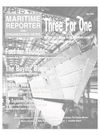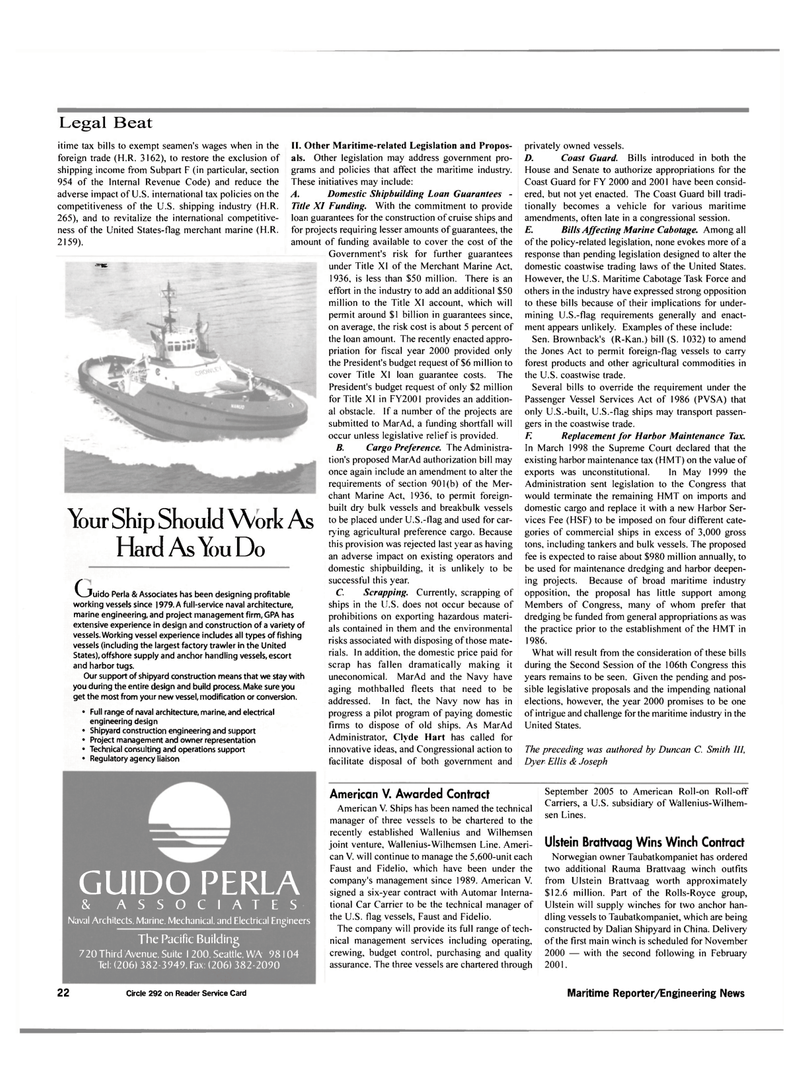
Page 22: of Maritime Reporter Magazine (May 2000)
Read this page in Pdf, Flash or Html5 edition of May 2000 Maritime Reporter Magazine
Legal Beat itime tax bills to exempt seamen's wages when in the foreign trade (H.R. 3162), to restore the exclusion of shipping income from Subpart F (in particular, section 954 of the Internal Revenue Code) and reduce the adverse impact of U.S. international tax policies on the competitiveness of the U.S. shipping industry (H.R. 265), and to revitalize the international competitive- ness of the United States-flag merchant marine (H.R. 2159). • 'W-
Your Ship Should Work As
Hard As ¥>u Do (juido Perla & Associates has been designing profitable working vessels since 1979. A full-service naval architecture, marine engineering, and project management firm, GPA has extensive experience in design and construction of a variety of vessels. Working vessel experience includes all types of fishing vessels (including the largest factory trawler in the United
States), offshore supply and anchor handling vessels, escort and harbor tugs.
Our support of shipyard construction means that we stay with you during the entire design and build process. Make sure you get the most from your new vessel, modification or conversion. • Full range of naval architecture, marine, and electrical engineering design • Shipyard construction engineering and support • Project management and owner representation • Technical consulting and operations support • Regulatory agency liaison
II. Other Maritime-related Legislation and Propos- als. Other legislation may address government pro- grams and policies that affect the maritime industry.
These initiatives may include:
A. Domestic Shipbuilding Loan Guarantees -
Title XI Funding. With the commitment to provide loan guarantees for the construction of cruise ships and for projects requiring lesser amounts of guarantees, the amount of funding available to cover the cost of the
Government's risk for further guarantees under Title XI of the Merchant Marine Act, 1936, is less than $50 million. There is an effort in the industry to add an additional $50 million to the Title XI account, which will permit around $1 billion in guarantees since, on average, the risk cost is about 5 percent of the loan amount. The recently enacted appro- priation for fiscal year 2000 provided only the President's budget request of $6 million to cover Title XI loan guarantee costs. The
President's budget request of only $2 million for Title XI in FY200I provides an addition- al obstacle. If a number of the projects are submitted to MarAd, a funding shortfall will occur unless legislative relief is provided.
B. Cargo Preference. The Administra- tion's proposed MarAd authorization bill may once again include an amendment to alter the requirements of section 901(b) of the Mer- chant Marine Act, 1936, to permit foreign- built dry bulk vessels and breakbulk vessels to be placed under U.S.-flag and used for car- rying agricultural preference cargo. Because this provision was rejected last year as having an adverse impact on existing operators and domestic shipbuilding, it is unlikely to be successful this year.
C. Scrapping. Currently, scrapping of ships in the U.S. does not occur because of prohibitions on exporting hazardous materi- als contained in them and the environmental risks associated with disposing of those mate- rials. In addition, the domestic price paid for scrap has fallen dramatically making it uneconomical. MarAd and the Navy have aging mothballed fleets that need to be addressed. In fact, the Navy now has in progress a pilot program of paying domestic firms to dispose of old ships. As MarAd
Administrator, Clyde Hart has called for innovative ideas, and Congressional action to facilitate disposal of both government and privately owned vessels.
D. Coast Guard. Bills introduced in both the
House and Senate to authorize appropriations for the
Coast Guard for FY 2000 and 2001 have been consid- ered, but not yet enacted. The Coast Guard bill tradi- tionally becomes a vehicle for various maritime amendments, often late in a congressional session.
E. Bills Affecting Marine Cabotage. Among all of the policy-related legislation, none evokes more of a response than pending legislation designed to alter the domestic coastwise trading laws of the United States.
However, the U.S. Maritime Cabotage Task Force and others in the industry have expressed strong opposition to these bills because of their implications for under- mining U.S.-flag requirements generally and enact- ment appears unlikely. Examples of these include:
Sen. Brownback's (R-K.an.) bill (S. 1032) to amend the Jones Act to permit foreign-flag vessels to carry forest products and other agricultural commodities in the U.S. coastwise trade.
Several bills to override the requirement under the
Passenger Vessel Services Act of 1986 (PVSA) that only U.S.-built, U.S.-flag ships may transport passen- gers in the coastwise trade.
F. Replacement for Harbor Maintenance Tax.
In March 1998 the Supreme Court declared that the existing harbor maintenance tax (HMT) on the value of exports was unconstitutional. In May 1999 the
Administration sent legislation to the Congress that would terminate the remaining HMT on imports and domestic cargo and replace it with a new Harbor Ser- vices Fee (HSF) to be imposed on four different cate- gories of commercial ships in excess of 3,000 gross tons, including tankers and bulk vessels. The proposed fee is expected to raise about $980 million annually, to be used for maintenance dredging and harbor deepen- ing projects. Because of broad maritime industry opposition, the proposal has little support among
Members of Congress, many of whom prefer that dredging be funded from general appropriations as was the practice prior to the establishment of the HMT in 1986.
What will result from the consideration of these bills during the Second Session of the 106th Congress this years remains to be seen. Given the pending and pos- sible legislative proposals and the impending national elections, however, the year 2000 promises to be one of intrigue and challenge for the maritime industry in the
United States.
The preceding was authored by Duncan C. Smith III,
Dyer Ellis & Joseph
GUIDO PERLA & ASSOCIATES
Naval Architects. Marine. Mechanical, and Electrical Engineers
The Pacific Building 720 Third Avenue, Suite I 200, Seattle, WA 98104
Tel: (206) 382-3949. Fax: (206) 382-2090
American V. Awarded Contract
American V. Ships has been named the technical manager of three vessels to be chartered to the recently established Wallenius and Wilhemsen joint venture, Wallenius-Wilhemsen Line. Ameri- can V. will continue to manage the 5,600-unit each
Faust and Fidelio, which have been under the company's management since 1989. American V. signed a six-year contract with Automar Interna- tional Car Carrier to be the technical manager of the U.S. flag vessels, Faust and Fidelio.
The company will provide its full range of tech- nical management services including operating, crewing, budget control, purchasing and quality assurance. The three vessels are chartered through
September 2005 to American Roll-on Roll-off
Carriers, a U.S. subsidiary of Wallenius-Wilhem- sen Lines.
Ulstein Brattvaag Wins Winch Contract
Norwegian owner Taubatkompaniet has ordered two additional Rauma Brattvaag winch outfits from Ulstein Brattvaag worth approximately $12.6 million. Part of the Rolls-Royce group,
Ulstein will supply winches for two anchor han- dling vessels to Taubatkompaniet, which are being constructed by Dalian Shipyard in China. Delivery of the first main winch is scheduled for November 2000 — with the second following in February 2001. 22 Circle 292 on Reader Service Card Maritime Reporter/Engineering News

 21
21

 23
23
